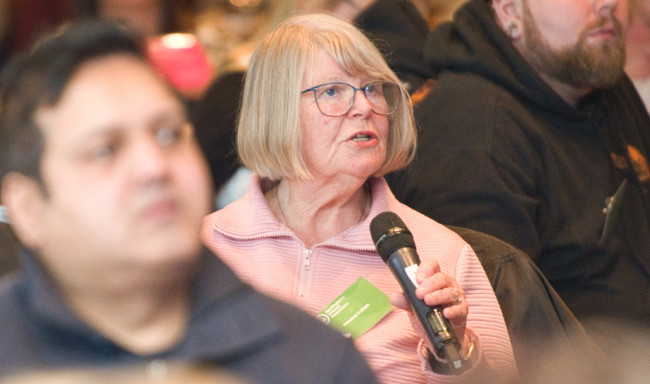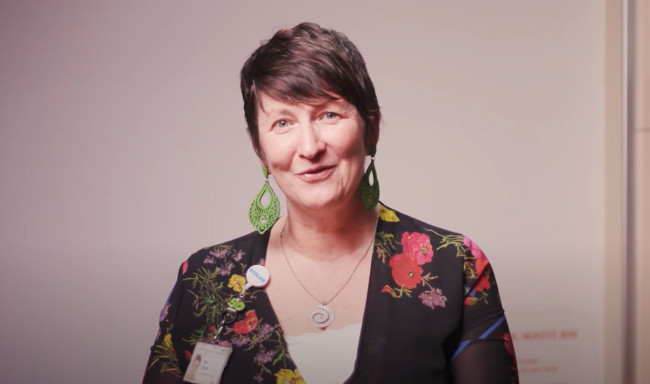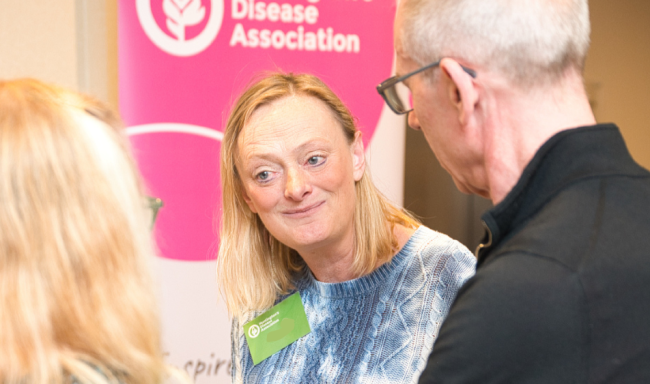Our Specialist Adviser, Chris speaks about his past experience as a genetic counsellor and how it has impacted his role in the charity.
I think it is wise to regard the decision to have a predictive test as one of the most important decisions you will make in your life. It is also a one-way street, when you know the result there is no way of going back to not knowing.
Where did you work before joining the charity?
"I worked in the NHS for over 30 years until retiring in 2022. Originally I was a mental health nurse but my role changed when I was in my mid-30s and I trained to be a genetic counsellor. As a genetic counsellor, I had a specialist role working with families affected by neurological genetic conditions, including Huntington’s disease."
Please tell us about your time working as a genetic counsellor
"Genetic counsellors work with families who are affected by conditions which have a genetic cause. There are many different genetic conditions. There are also different inheritance patterns. Some genetic conditions follow a dominant inheritance pattern, such as Huntington’s disease, whereas others may follow a different inheritance pattern. A genetic counsellor provides information about the condition and the inheritance pattern. In many cases, it is possible for people to have a genetic test to find out if they have a copy of the gene which causes the condition in their family. A genetic counsellor can help someone make an informed decision about whether to have a genetic test or not. If someone decides to have a genetic test, the genetic counsellor may take a blood sample for testing, discuss the result of the test and support someone in the period after finding out their test result."
A genetic counsellor may also have a role in the discussion of options during pregnancy, such as prenatal testing. Pre-implantation genetic testing, which combines IVF with the genetic testing of embryos, is also something that a genetic counsellor may discuss with someone who wants to explore that option.
Why did you become a specialist adviser and work with people affected by Huntington’s disease?
"When I retired I did not have any intention of working again. I had a part-time job working behind the bar in a pub, to earn a bit of extra money on top of my pension, but did not intend to do any more than that. However, after being retired for about a year I started to feel that I still wanted to be doing something to help others and to make use of the years of experience that I had. Just at the time that I was thinking about this, the Huntington’s Disease Association were looking to recruit an adviser to work in my area, so it seemed a really good opportunity that came up at just the right time."
How do you think your experience as a genetic counsellor has helped you as a specialist adviser?
"I think all of the advisers bring their own particular knowledge and experience to the role. Some advisers have years of experience of caring for people with Huntington’s disease and may have worked in care homes or as health professionals. I bring an understanding of genetics, of how genetics clinics work and an awareness of the issues that people consider when making a decision about genetic testing."
I think as a group the advisers complement each other, because of the range of different experiences that we each bring to the role.
How have you used your past experience to educate the community further about genetics and testing?
"I’ve been in post since 2023 and have delivered training about genetics to colleagues as well as participating in training that is delivered to the community. Although delivering formal training sessions is something that I am happy to do, in many ways I think that I have made more use of my past experience informally, such as when advisers or other members of the community contact me with one-to-one questions or want some advice on a certain aspect of genetics or genetic counselling."
Why do you feel the counselling side of getting tested is so important?
"I think counselling is particularly important prior to a predictive test. Partly, this is to ensure that someone who proceeds with the test is doing so from a position of being fully informed and having properly considered the implications that the test result will have. It is also important so that someone can understand their test result, this is why the relevance of the CAG repeat size and the different possible results, including the reduced penetrance range, are discussed prior to testing. The counselling process also makes sure that someone has felt that they want to have the test for some time before they actually proceed with the test, usually a period of months during which the counselling appointments take place. This can be frustrating for people who feel that they are certain that they want to have the test.
I have known many people who have changed their minds about testing during the period of pre-test counselling. I think this is particularly important when someone has only recently found out that they are at risk and there is a danger that they may rush into testing as an initial reaction to this information.
"Having been a genetic counsellor I can also look at the situation from the point of view of the person who is making the decision to offer the test. As the genetic counsellor you want to make sure that someone is fully informed and making a considered decision, but you also want to make sure that appropriate support is in place. The pre-test counselling will also include a discussion of what support someone has in place and whether any additional support should be put in place prior to testing, such as for someone who may need extra support because of a concern about their mental health. The pre-test counselling period creates the time and space to make sure that appropriate support is in place, before proceeding with the test."
Is there any advice you would give to those thinking about starting their testing journey?
"I think it is wise to regard the decision to have a predictive test as one of the most important decisions you will make in your life. It is also a one-way street, when you know the result there is no way of going back to not knowing. Therefore, if you have doubts it is best not to proceed because you still have the option to proceed with the test at some time in the future. Your genetic counsellor will support your decision not to proceed if you change your mind at any point during the process. It can also help to break the decision down into two parts. I always thought that people who came to see me for pre-test counselling were making two decisions. The first decision they are making is whether to have the test or not. The second decision they are making is when is the right time in their life to have the test. Once you break the decision down in this way it becomes possible to decide that you are going to have the test, but to make a separate decision about the timing of the test at a later date."
Thank you to Chris for sharing this experience with us.
Genetic counselling
If you want to learn more about predictive testing for Huntington's disease, you can visit our testing page which includes information on testing plus videos and guides to help you understand the process.




